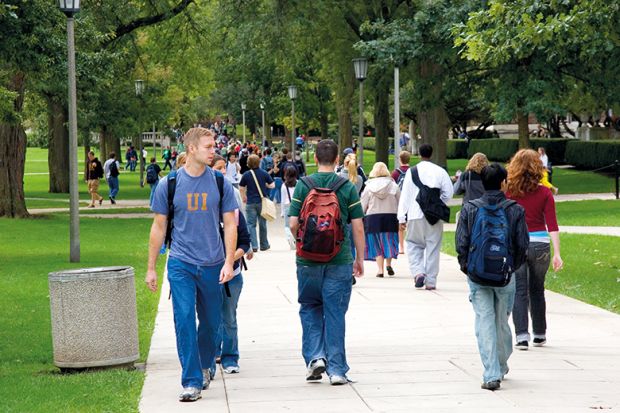The head of the University of Illinois system has claimed that the institution is finally “on the march” after being rocked by a two-year state budget impasse, but admitted that there is still “some distance to go” on repairing its reputation.
Timothy Killeen, president of the public University of Illinois system, which has three campuses (Chicago, Springfield and Urbana-Champaign), said that the institution planned to recruit 900 faculty in the next five years and was making headway on its new $1 billion (£760 million) “Discovery Partners Institute” – a research and innovation centre that is set to open in 2023.
These are investments the system could only dream of making three years ago, when public universities in Illinois were caught in the middle of a budget stalemate that saw them go without an official state budget for two years.
“When I arrived as president I must have said something, I joke, because the budget didn’t go down – it went away,” said Professor Killeen, who took over the helm of the institution in May 2015, just two months before the funding impasse began.
Despite the financial issues, student enrolment at the Illinois system grew by about 8 per cent during the two-year stalemate, although the number of academics rose by just 2 per cent over that time. Some of the tuition revenue from the enrolment growth is now being used to meet the new academic recruitment target.
The system has also established a new $60 million start-up fund for recruiting senior established scholars, with the aim of hiring 10 such academics a year. The university has already exceeded the target, bringing on board 14 prestigious researchers from institutions including Duke and Harvard universities in the past year.
“Between philanthropy, expanded enrolments and the tuition [fees] associated with that, we have weathered the state issues remarkably well,” Professor Killeen said. “Yes, there are still some war wounds from the recent past but I think we’re on the march.”
Professor Killeen is also hopeful that the system won’t have to go without a state budget again in the near future.
The institution is seeking a new partnership with the state that would guarantee a predictable level of state funding for five years in exchange for the system meeting certain performance outcomes in areas such as graduation and retention rate, financial aid and enrolment of students from under-represented groups.
Meanwhile, last year the state allocated $500 million to the University of Illinois system for the development of the Illinois Innovation Network and its central hub, the Discovery Partners Institute – funding that the system itself will match. The new centre will include hubs across the state and a main site in downtown Chicago, in a bid to spur economic development through research, public-private partnerships, entrepreneurship and workforce training programmes.
Professor Killeen said that the institute, which will enable academic and student exchanges and collaborative research, will include industry and university partners from across the world. The University of Chicago, Northwestern University, the Hebrew University of Jerusalem and Tel Aviv University are already on board.
However, Professor Killeen admitted that the system was still battling negative perception that arose as a result of the state budget issues.
“We need to be competing on quality and cost [of education], brilliance of faculty and reputation. I think we’ve got some distance to go on reputation because of Illinois’ saga,” he said.
Register to continue
Why register?
- Registration is free and only takes a moment
- Once registered, you can read 3 articles a month
- Sign up for our newsletter
Subscribe
Or subscribe for unlimited access to:
- Unlimited access to news, views, insights & reviews
- Digital editions
- Digital access to THE’s university and college rankings analysis
Already registered or a current subscriber?








